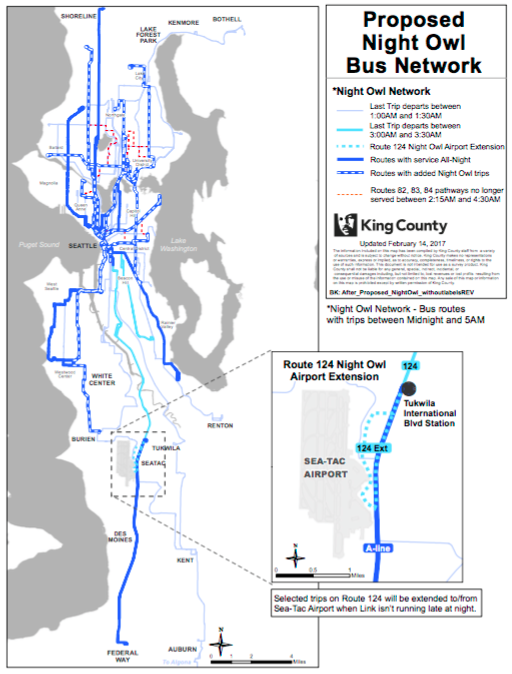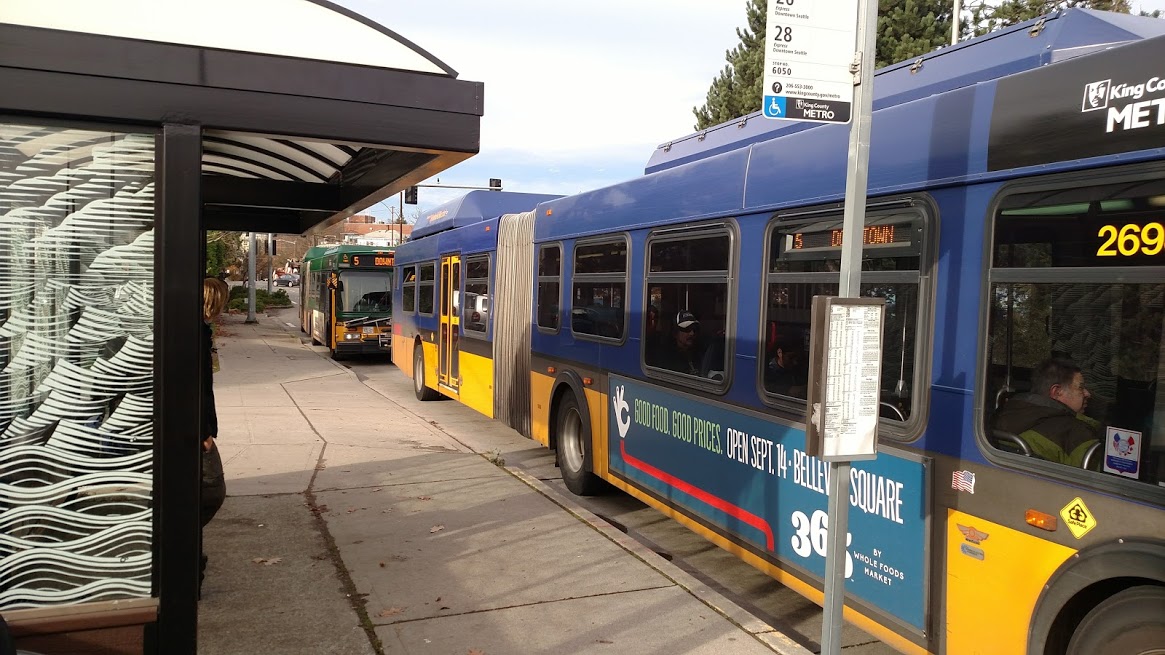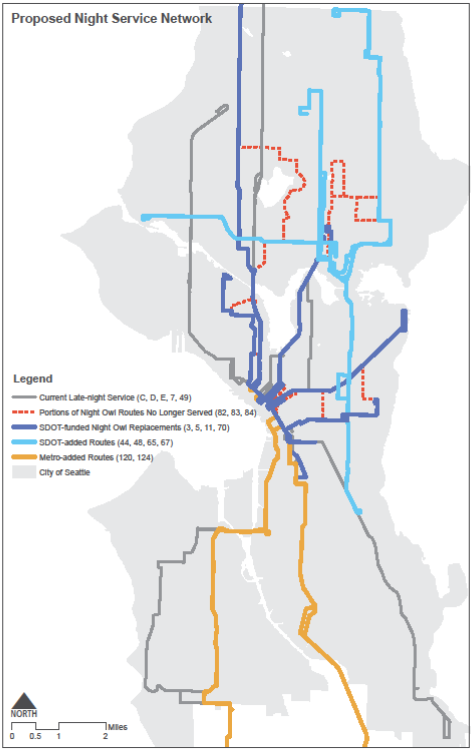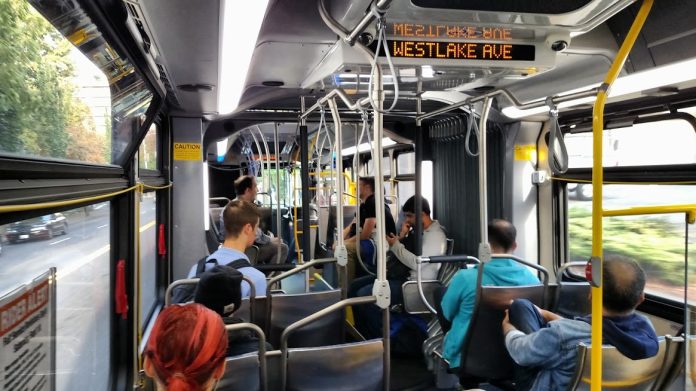Late-night bus service is poised to get a major upgrade this year. The Night Owl route network will get a boost in service hours and see the legacy spaghetti routes give way to a connected, legible network. Up to 11,000 service hours would be allocated to expanded late-night bus service with 8,800 service hours directly funded by the City of Seattle through Proposition 1 dollars. The proposal would also put a nail in the coffin on Routes 82, 83, and 84 which would finally meet their demise. Service hours from those routes would be reinvested to better performing routes.
The proposal that King County Executive Dow Constantine and Seattle Mayor Ed Murray have submitted to the King County Metropolitan Council is somewhat similar to the one we saw floated in October 2016. The primary differences, however, is that new service on Route 62 has been dropped while service on Routes 44, 48, 65, and 67 have been added. The latter changes should facilitate better service to Northeast Seattle neighborhoods and make direct connections between neighborhoods much easier in North Seattle and east of Downtown.

Upthegrove Pushing Free Transit On Boozy Holidays
Meanwhile, King County Councilmember Dave Upthegrove wants to go a step further and extend transit service and make it free on “boozy” holidays of New Year’s Eve and Fourth of July. He has requested Executive Constantine prepare a report on how to do that by June 1st.
Because of the benefits to public safety and personal mobility, King County Metro should explore options for providing free late-night service on the Fourth of July and the evening of New Year’s Eve and early morning of New Year’s Day. King County Metro should explore partnerships to fund, promote and sustain the free late-night service. King County Metro should also encourage other transit agencies in the central Puget Sound region to provide free late-night service on those holidays.
King County Councilmember Upthegrove is also a Sound Transit Board Member so conceivably he could exercise some influence on the transit agency. Other cities have superior late night transit service, as Upthegrove explained.
“[T]ransit agencies in Chicago, Long Beach, Los Angeles, Milwaukee, Minneapolis-St. Paul, Orange County (California), Portland (Oregon), San Francisco, San Jose and Vancouver (British Columbia) are among those providing free transit service on New Year’s Eve and early morning of New Year’s Day,” Upthegrove argued in his legislation.
In contrast, the Seattle Department of Transportation’s strategy has recently relied on partnering with app-based taxi company Uber instead of extending transit service on boozy holidays like New Year’s Eve. The scheme seems to go like this: Uber offers a $10 voucher and gets good press and essentially free advertising from the City. Of course surge pricing often erased any savings and left many late-night revelers with a hefty fare even with the voucher.
Good luck using your $10 @seattledot #VisionZero Uber discount. Here's the price for a 2 mile ride. pic.twitter.com/IuOriJzdJH
— Qagggy! (@Qagggy) January 1, 2017
Plus, despite Uber’s claims to the contrary, the most comprehensive study to date showed Uber service did not decrease the rate of drunk driving deaths. By associating Uber service with the Vision Zero campaign–it’s literally the first bullet point–the City has been lending credibility to the claims Uber makes streets safer. We’ve argued Vision Zero is about safe street designs. Ironically, the City has fallen woefully behind on implementation of its Bike Master Plan and its Pedestrian Master Plan while using Uber as window dressing–three people have already died on Seattle streets in 2017.
Huge turnout for the community memorial for Ronacin. https://t.co/tArlMZShH0 pic.twitter.com/dwJZZzRFs8
— Seattle Bike Blog (@seabikeblog) January 28, 2017
Upthegrove’s interest in a more effective and equitable solution for New Year’s Eve and Fourth of July service is commendable.
“Upthegrove says he’s still talking to colleagues about his drunk bus proposal and doesn’t yet know how much support there is for it,” Casey Jaywork reported in Seattle Weekly. “His motion is tentatively scheduled for a hearing in the county council’s Transportation, Economy and Environment committee on March 7.”
Night Owl Upgrades


Funding from Seattle would make up the bulk of the service changes, which fall largely into three buckets.
1. Replacing the legacy spaghetti Night Owls:
- Adding two additional trips to Route 3 (Judkins Park, Downtown, and Queen Anne) between 2am and 5am, which makes up for the loss of Route 82;
- Adding two additional trips to Route 5 (Downtown, Phinney Ridge, Greenwood, and Shoreline) between 2am and 5am, which makes up for the loss of Route 82;
- Adding two additional trips to Route 11 (Downtown, Capitol Hill, and Madison Park) between 2am and 5am, which makes up for the loss of Route 84; and
- Adding two additional trips to Route 70 (Downtown, South Lake Union, Eastlake, and University District) between 2am and 5am, which makes up for the loss of Route 83.
2. Introducing new late-night bus service to areas in Northeast Seattle:
- Adding late-night service on Route 65 (University District, Wedgwood, Lake City, and Jackson Park) for the first time between 2am and 5am; and
- Adding late-night service on Route 67 (Northgate, Maple Leaf, Roosevelt, University District, and Laurelhurst) for the first time between 2am and 5am.
3. Boosting late-night bus service connections:
- Adding additional trips to Route 44 (Ballard, Fremont, Wallingford, and University District) to support crosstown options and connections instead of forcing transfers in Downtown; and
- Adding additional trips to Route 48 (University District, Montlake, Central District, and Mount Baker) to support crosstown options and connections instead of forcing transfers in Downtown.
Metro would also directly fund late-night bus service improvements through an additional 2,000 services, which include:
- Extending late-night service on Route 120 (Downtown, Delridge, White Center, and Burien) by adding one extra trip during the 2am and 3am hours;
- Extending the alignment of Route 124 from Tukwila International Boulevard Station to Sea-Tac Airport after 1am;
- Upgrading service on the RapidRide C, D, and E lines to at least once hourly late a night, which currently operate less frequently; and
- Padding bus schedules as necessary.
Metro says that the agency and its partners currently spend approximately $7.7 million for the late-night bus system (operated from midnight to 5am). That could grow by $730,000 under the proposal, of which $500,000 would be directly funded by Seattle, bringing that figure to more than $8.4 million annually. The King County Metropolitan Council will still need to approve the plan, which could be implemented in September as part of Metro’s regular twice yearly service change.
One question still unanswered is whether Sound Transit will extend late night light rail service, either on boozy holidays or generally. Sound Transit runs Link from 5am to 1am Monday to Saturday (on Sundays and holidays Link runs from 6am to midnight.) Sound Transit has contended it needs the four hour service gap to do maintenance work, although other transit agencies do have shorter windows. Light rail service would certainly help fill out the late-night network, speed commutes, and better entice people out of cars.
Doug Trumm is publisher of The Urbanist. An Urbanist writer since 2015, he dreams of pedestrian streets, bus lanes, and a mass-timber building spree to end our housing crisis. He graduated from the Evans School of Public Policy and Governance at the University of Washington in 2019. He lives in Seattle's Fremont neighborhood and loves to explore the city by foot and by bike.



